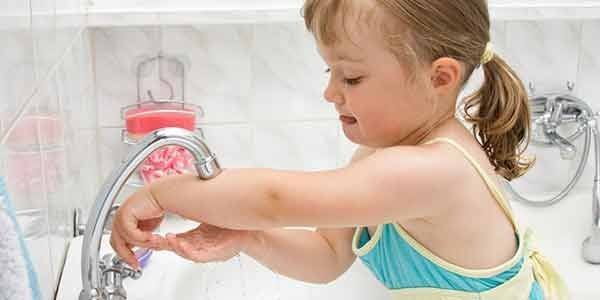Why is it so important to teach children to wash their hands before eating?

Wash your hands before eating! – who has not heard this painfully familiar phrase to most of us. But doctors, especially infectious disease specialists, repeat it over and over again. If children and adults constantly followed this rule, diseases would be much less.
Babies and Germs
“Diseases from dirty hands” threaten adults, of course, but young children are at much greater risk. Not only because the children have not yet developed stable habits of observing hygiene norms.
In the stomach of young children, unlike that of adults, less hydrochloric acid is formed and their digestive enzymes are not yet active enough, which is why viruses and worm eggs penetrate more easily from the stomach into the intestines.
p>
And due to the high permeability of the intestinal mucosa, toxins entering the children’s body easily penetrate into the blood. In addition, their immune system is in the process of being built, therefore they lack the protective antibodies that could destroy pathogenic microorganisms.
Unfortunately, in young children, even an insignificant amount that has entered their body can cause serious disturbances in the function of the gastrointestinal tract, cardiovascular and nervous systems, spleen, liver and other organs.< /p>
That is why it is very important that parents regularly monitor the cleanliness of their child’s hands.
Washing the child’s face and hands is necessary not only when they look dirty, even when the dirt on them is not visible. It is especially important to teach the child to wash his hands before eating and after using the toilet, when returning from a walk and after contact with animals.
Even after contact with money /metal or paper it doesn’t matter/. Observance of these simple rules will protect your child from the so-called “diseases of dirty hands”, which are quite numerous.
The way they spread is oral-fecal.
That is, through the unwashed hands with which the child touches his mouth or touches the food he consumes with them. Among such diseases are not only intestinal infections and worms, but also salmonellosis, dysentery, typhoid, cholera, hepatitis A, enterovirus and rotavirus infections.
Although the way of transmission of viruses is airborne, the causative agents of these diseases can also enter the body through contaminated hands. Due to the cold season, which can be said to be over for Bulgaria, frequent hand washing is one of the main ways to prevent them.
However, the health authorities warn about the danger of the disease tularemia, which was forgotten in our lands, but since the beginning of 2015 there have been about 20 registered cases, and regular hand washing is one of the main ways to prevent it.< /p>
At home, on a visit or in a cafe, one has access to water and soap, but on the road or in nature, for example if we are on a picnic, there is no such possibility.
In such a case, it is necessary to use a special antiseptic gel or wet antibacterial wipes, which will remove not only the visible dirt from the hands, but also a large part of the disease-causing bacteria. At home, however, antibacterial soap should not be used.
Because, in addition to harmful microbes, similar products /which usually contain the substance triclosan/ also destroy the beneficial bacterial flora that inhabits the human skin.



